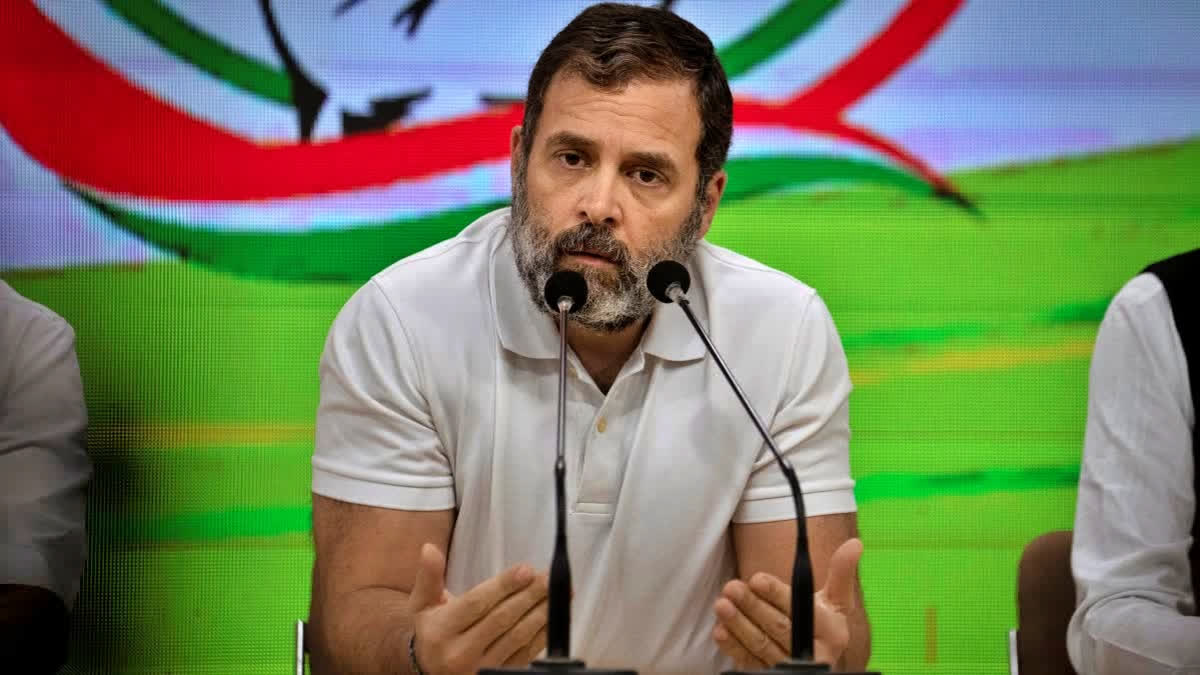New Delhi: Former Congress president Rahul Gandhi Saturday moved the Supreme Court challenging the Gujarat High Court's refusal to stay his conviction in the criminal defamation case over his 'Modi surname' remark.
In his petition, Gandhi said he did not get a "fair trial" in the present case from the very beginning and "if political satire were to be held to be a base motive, then any political speech which is colourfully critical of the government would become an act of moral turpitude, which would completely corrode the foundations of democracy". The conviction in the case led to his disqualification as a Lok Sabha MP earlier this year.
Gandhi’s plea said he has the right to criticize and comment upon the measures undertaken by the prime minister, who is his political opponent, and merely because he was critical or he had a different opinion, the complaint for defamation can’t be sustained against him. “It is in that context that the Petitioner addressed Prime Minister Shri Narendra Modi as a thief for a substantial reason that the money of the poor people of the country was given away to Shri Anil Ambani. Neither complainant nor his witnesses say that the allegations in this regard were false. The Petitioner, if at all spoke as to why the surname of all thieves is Modi, he spoke of it in relation to this theme of misgovernance of Shri Modi and not in connection with any Modi samaj or persons holding Modi surname”, said the plea.
The plea contended that the high court after considering the irrelevant factor(s) has invented a hitherto unknown definition for the seriousness of an offence through several leaps of logic - by first misreading and misconstruing the idea of ‘moral turpitude’ and then using that misconstrued notion also to misconstrue the idea of a ‘serious offence.’
The plea contended that depravity and vileness, which are the essential core of moral turpitude, are associated with rapists, serious murderers, heinous violence, and such other similar crimes. “To equate a political speech criticizing the government or a section of society, even if defamatory, sets a completely incongruous standard unknown to jurisprudence which deals with moral turpitude”, it added.
Also read: Smriti Irani hits back at Rahul Gandhi; calls him 'frustrated dynast'
The plea contended that the high court has manifestly fallen in error in using the same parameter for determining the seriousness of offence in the present case, wherein , the petitioner has exceptionally been given the maximum punishment of 2 years of imprisonment.
Gandhi’s plea contended that if the high court judgment is not stayed, it would lead to throttling of free speech, free expression, free thought, and free statement. “It would contribute to the systematic, repetitive emasculation of democratic institutions and the consequent strangulation of democracy which would be gravely detrimental to the political climate and future of India”, said the plea.
The plea emphasized that in a democracy the opinion of the people is supreme and the choice of the voter is treated as the will of the people. “The verdict under appeal has directly led to a situation resulting in the disqualification of the Petitioner as a legislator. If the operation of the judgment of conviction is not stayed, a by-election shall be held within the period stipulated and the petitioner shall forfeit his right to represent the constituency and his political party for the remaining part of his tenure.”, said the plea.
It further argued that this loss is irreparable as even the subsequent acquittal of the petitioner cannot undo the same and the issue may also be looked at from the point of view of the electorate. “The disqualification of an elected representative essentially interferes with the choice of the electorate in a free and fair election”, said the plea.
A stay on his conviction from the Supreme Court could pave the way for Gandhi's reinstatement as a Lok Sabha MP. The criminal defamation case against Gandhi stemmed from his 2019 remark made during an election rally in Kolar, Karnataka. Bharatiya Janata Party (BJP) MLA Purnesh Modi, representing Surat West, filed the case in response to Gandhi's statement questioning how "all thieves have Modi as the common surname”.
On March 23, 2023, a metropolitan magistrate's court in Surat convicted Gandhi under Sections 499 and 500 of the Indian Penal Code (IPC), which pertain to criminal defamation, and sentenced him to two years in prison.
Gandhi was elected to the Lok Sabha from Wayanad in Kerala in 2019, and he was disqualified as MP under the provisions of the Representation of the People Act after a metropolitan magistrate's court in Surat sentenced him to two years in jail after convicting him under Indian Penal Code (IPC) sections 499 and 500 (criminal defamation).
Also read: Manipur burns, EU Parliament discusses it but PM hasn't said a word: Rahul



